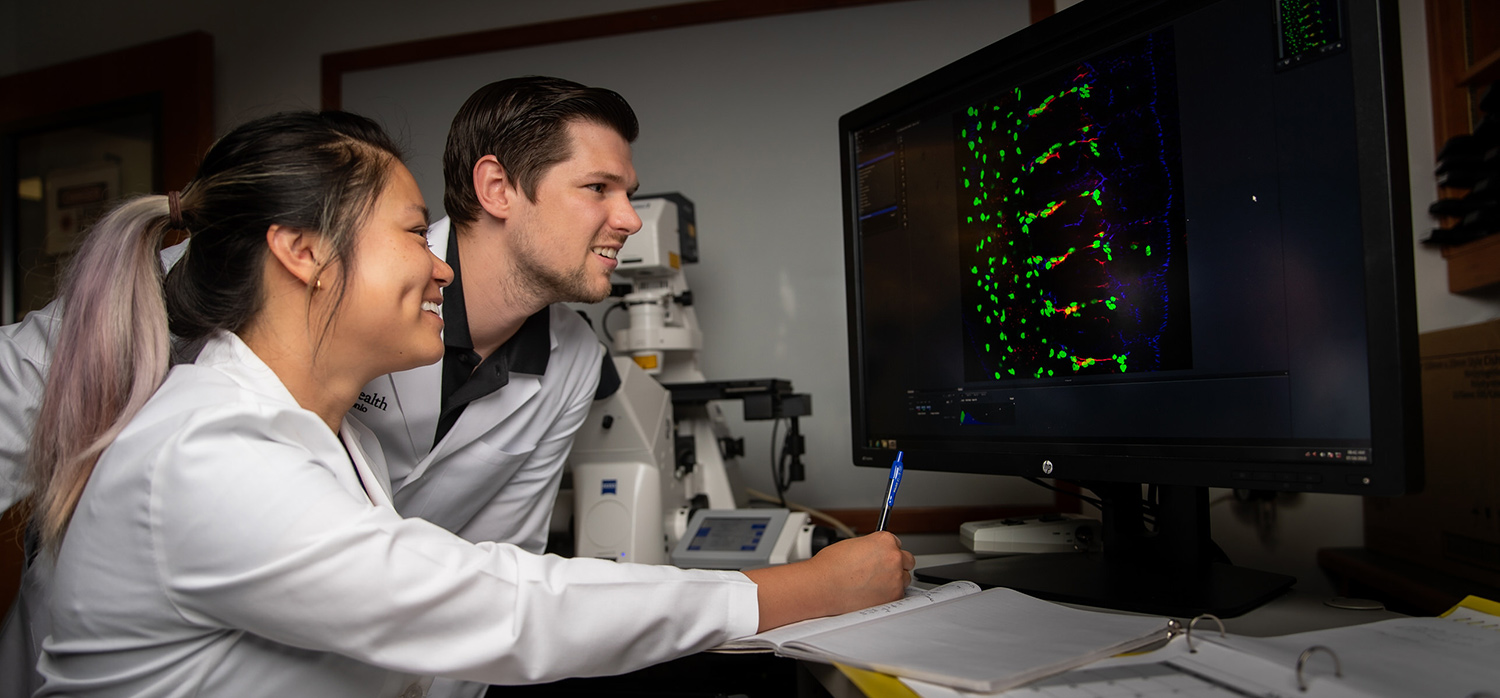

Major Areas of Research:
Addiction
UT Health San Antonio is home to the Addiction Research, Treatment & Training Center of Excellence (ARTT). Students apply a variety of approaches to the study of addiction including behavioral pharmacology, biochemistry, electrochemistry, electrophysiology, molecular pharmacology, and neuropharmacology. Human laboratory studies and clinical trials are also ongoing.
Aging
Our students conduct cutting-edge research in the molecular networks that govern the basic biology of aging. They test genetic and pharmacological interventions in invertebrate and vertebrate animal models for their ability to retard aging and minimize its deleterious effects. Specific diseases and physiological deficits associated with aging that are targeted include sarcopenia, metabolic dysregulation/diabetes, cognitive impairment, dementia, and Parkinson’s disease.
Behavioral Pharmacology
Our students, applying basic principles of pharmacology to the study of behavior, investigate the effects of drugs with an emphasis on effects in the whole organism to better understand the pharmacologic mechanisms that underlie conditions, such as depression, autism, pain, and addiction, and to discover novel treatments for these disorders.
Cardiovascular function in health and disease
Our students investigate mechanisms of myocardial and cerebral ischemia-reperfusion injury (myocardial infarction and stroke), renal and neural mechanisms regulating blood pressure (hypertension), neural control of respiration (sleep apnea), and heart rate (arrhythmias). Laboratories emphasize therapeutic targeting of pathogenic mechanisms.
Neurological diseases of aging
Our students investigate molecular and biochemical events that cause neurological diseases of aging, including Alzheimer’s and Parkinson’s disease. They use genetic manipulations in rodent and invertebrate models, behavioral, biochemical, and immunohistochemical approaches, in vivo brain optical and functional imaging including MRI and PET, in vivo brain blood flow measures, and cellular and molecular biology tools to understand the initiating molecular events in dementias and determine the effects of potential drug candidate molecules.
Neuropharmacology
Diseases/disorders of the central nervous system (e.g., depression, anxiety, schizophrenia, addiction, Parkinson’s Disease, Alzheimer’s Disease, migraine, epilepsy, etc.) are prevalent. While all of these are treated with drugs, there are serious drawbacks to current pharmacotherapy, including lack of efficacy and high incidence of adverse effects. Students perform research to understand mechanisms that underlie current drug action and to develop improved medications to treat these devastating diseases.
Neurophysiology
Our students investigate mechanisms of mood disorders (e.g., depression, anxiety, PTSD), social interaction (e.g., autism, fragile X syndrome), neurodegenerative diseases (e.g., Parkinson’s, ALS, MS), dementia (e.g., Alzheimer’s), drug addiction (e.g., opioids, amphetamine, cocaine) as well as regulation of food intake and energy expenditure (e.g., obesity, exercise). Emphasis is placed on genetic mechanisms, neural-glial interactions as well as synaptic and ion channel plasticity. Laboratories emphasize therapeutic targeting of pathogenic mechanisms.
Metabolism and regulation of energy homeostasis
Our students use cell culture and tissue-specific transgenic and knockout animal models to understand the molecular mechanisms leading to various metabolic diseases such as obesity, insulin resistance, and type 2 diabetes. They also identify and characterize novel secretory molecules from human and mouse sera with the hope to develop effective therapeutic treatments to improve energy homeostasis.
Pain Physiology and Pharmacology
Our students conduct research on pain mechanisms, including nociceptor transduction, sensitization, and activation. This includes studies developing novel, non-opioid, non-addictive analgesic drugs using high throughput screening methods. Parallel clinical trials allows our students to learn translational research. A weekly pain journal club and a team science environment fosters these outstanding training opportunities.
Pharmacology of Anticancer Drugs
Our students conduct modern drug discovery from diverse sources to identify the next generation of anticancer drugs. They identify the molecular mechanisms of action of new and current drugs to facilitate the optimal use of these drugs clinically.